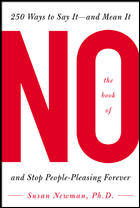 Review by Review by
Richard SumrallScenario 1: "I hate to ask you, but when
you're in the store could you pick up a few things for me for dinner?"
Scenario 2: "My gifts never look as beautiful as yours. Will you wrap these
presents for me?" Scenario 3: "I need to leave early. Will you tell the boss
I wasn't feeling well if she asks?"
Sound familiar? These scenarios represent different situations we can
find ourselves in with friends, family or at work when we agree to something
when we should have said no.
In her new book, "The Book of No," author and social psychologist Dr.
Susan Newman describes how the "incontrollable yes" can take your life and
how you can regain control by learning to refuse unreasonable or unwelcome
requests.
According to Newman, "Most people have been programmed to think ‘no'
carries a strong backlash. . . . In fact, the damage done by saying yes
indiscriminately affects you much more than your refusals affect the people
you turn down."

As children we have the word "no" drilled out of us by parents, teachers
and friends. Today adults have to redevelop their skills in turning people
down, skills that are explained in Newman's five-step process: List your
yeses over a one-week period; pay attention to how you parcel your time; get
your priorities straight; define and know your limits; and give control to
others to ease your own responsibilities. Saying no is a learned
skill. You can think of it as an "adventure into the unknown with delicious
bounty at the end of the journey -- a calmer life with you supervising it."
"With Friends"
Telling a friend no is never easy. There's always the need to make
yourself crystal clear without getting too personal. Sometimes you have to
give an evasive or noncommittal answer in order to buy yourself additional
time. According to Newman, "Saying no will not turn you into a bully or make
you insensitive or petty. . . . By being more selective about the demands
you respond to, you'll have time to assist only those you want to help --
real friends whose friendships you want to preserve."
[to top of second column]
 |

"All in the Family"
It's even more difficult regarding the matter of saying no
to family members. Walking this tightrope can be tricky, given the
delicate feelings toward loved ones such as parents, siblings,
spouses, children and the in-laws. One ill-timed or well-meaning no
can "ignite a family feud that last for months, years or a
lifetime. . . . In short, you can have a disturbing familial mess."
One solution is to stop the perception that you are the "go-to
person" in the family. If you're nothing more than the family
lackey, afraid to say no for fear of not being thought of as a good
person, you can end up turning your life over to your family's
bidding. In other words, "You tell yourself and your family that you
are not important, that they come first."
"At Work"
It's one thing when you say no to friends and family; it's
an entirely different matter at work. Because of the
supervisor-employee relationship and the intricacies of office
politics, saying no can potentially harm your standing and
credibility with your boss or fellow employees.
In navigating this minefield Newman dispels the myth that
"agreeing to demands and requests, no matter how absurd, keeps
bosses and clients happy." In fact, "If you stretch yourself too
thin, you run the risk of making mistakes or doing a mediocre job."
Newman recommends that employees avoid this trap through a cautious,
realistic approach to the amount of work you can take on, in order
to prevent you from performing poorly and causing long-term harm to
your reputation and career.
"The Book of No" is an important book for anyone feeling
overwhelmed, overworked or taken advantage of because they can't say
no. Part of learning how to say no is adopting the 16-point
"No Credo": your "bill of rights to the freedom and life you
deserve."
In the author's note, Newman writes, "This book was not created
to justify the egomaniac who wants everything his or her way. Rather
it's for the all too many of us who too often say yes when the
circumstances don't really require compliance." This book is
recommended to anyone who wants to strengthen their assertiveness or
improve their interpersonal communication skills.
[Richard Sumrall,
Lincoln Public
Library District]
|